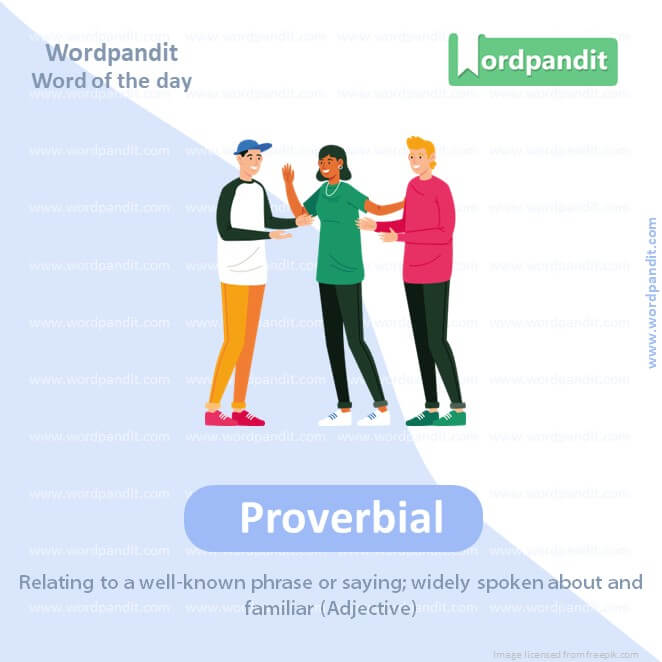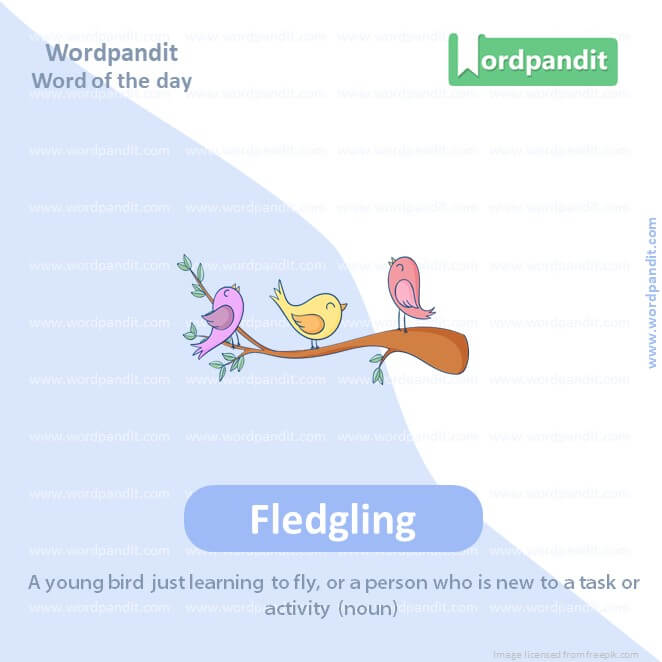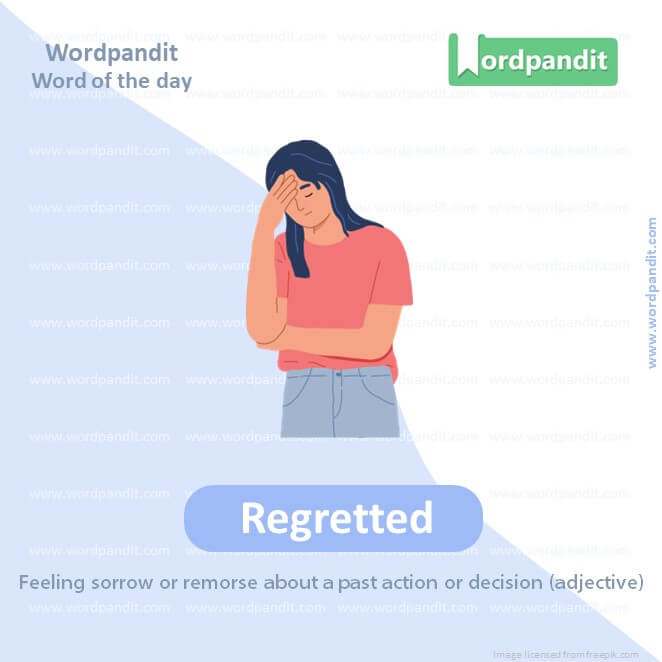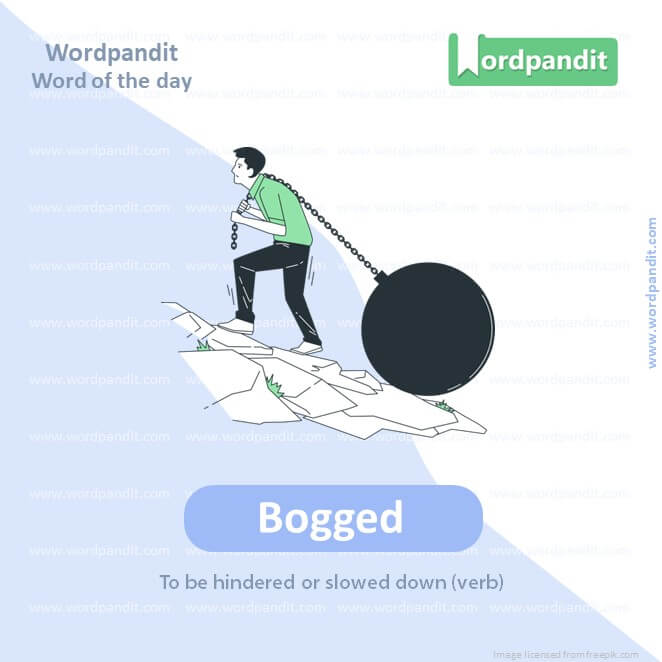Daily Vocabulary Words: List of Daily Used Words in Leading Indian Newspapers
Hi there. Welcome to this special section @ Wordpandit. Our endeavour here is straightforward: highlighting daily vocabulary words that you would come across in leading newspapers in the country. We have included the following newspapers in our selection:
• The Times of India
• The Economic Times
• Hindustan Times
• Mint
• Indian Express
We are putting in extensive work to develop your vocabulary. All you have to do is be regular with this section and check out this post daily. This is your repository of commonly used words; essentially, we are posting a list of daily used words. Hence, this has significant practical application as it teaches you words that are commonly used in leading publications mentioned above.
Visit the website daily to learn words from leading Indian newspapers.

WORD-1: Proverbial
CONTEXT: It is less about kicking down doors than spotting patterns in data and intelligence to track down the proverbial needle in the haystack.
SOURCE: Hindustan Times
EXPLANATORY PARAGRAPH: Imagine a saying or phrase that everyone knows because it’s been used so often. That’s like “proverbial.” It means something that is commonly known or talked about, especially due to being repeated frequently.
MEANING: Relating to a well-known phrase or saying; widely spoken about and familiar (Adjective).
PRONUNCIATION: proh-vur-bee-uhl
SYNONYMS: well-known, traditional, typical, customary, clichéd
USAGE EXAMPLES:
- He was famous for his proverbial wisdom and insightful sayings.
- The proverbial early bird catches the worm is often quoted in discussions about productivity.
- Her patience was tested beyond the proverbial breaking point.
- The town’s proverbial hospitality made visitors feel welcome.
WORD-2: Heinous
CONTEXT: Even more heinous than drug crime, cybercrime, and financial crime, are those which exploit vulnerable people as a commodity to trade for profit.
SOURCE: Hindustan Times
EXPLANATORY PARAGRAPH: Imagine something extremely bad or evil, like a crime that shocks people because of how terrible it is. That’s like “heinous.” It means shockingly wicked, evil, or abominable.
MEANING: Shockingly wicked, evil, or abominable (adjective).
PRONUNCIATION: hee-nuhs
SYNONYMS: atrocious, monstrous, vile, wicked, despicable
USAGE EXAMPLES:
- The heinous crime shocked the entire community.
- His heinous acts of violence earned him a life sentence.
- The dictator’s heinous regime led to widespread suffering.
- The heinous nature of the offense called for severe punishment.

WORD-3: Fledgling
CONTEXT: the BJP has a robust organization and has also helped the fledgling Shiv Sena (Shinde group) in building its organization.”
SOURCE: Hindustan Times
EXPLANATORY PARAGRAPH: Imagine a baby bird that’s just learning to fly and isn’t fully grown yet. That’s like a “fledgling.” It refers to something or someone that is new, inexperienced, or just starting out.
MEANING: A young bird just learning to fly, or a person who is new to a task or
activity (noun).
PRONUNCIATION: flej-ling
SYNONYMS:
- Adjective: novice, beginner, inexperienced, budding, emerging
- Noun: beginner, novice, learner, apprentice, newcomer
USAGE EXAMPLES:
- The fledgling company struggled to establish itself in the market.
- She was a fledgling writer, eager to improve her skills.
- The team consisted of both experienced professionals and fledgling talents.
- The fledgling actor landed her first major role in a popular TV series.

WORD-4: Regretted
CONTEXT: the Maharashtra unit in 2023 in which she had actually regretted the party’s failure to expand its network here.
SOURCE: Hindustan Times
EXPLANATORY PARAGRAPH: Imagine feeling sorry about something you did or didn’t do, wishing you could change it. That’s like “regretted.” It means feeling sorrow or remorse about a past action or decision.
MEANING: Feeling sorrow or remorse about a past action or decision (adjective).
PRONUNCIATION: ri-gret-id
SYNONYMS: remorseful, sorry, apologetic, repentant, contrite
USAGE EXAMPLES:
- He regretted not taking the opportunity when it was presented to him.
- She regretted her harsh words as soon as they left her mouth.
- They regretted not saving enough money for their retirement.
- The regretted decision haunted him for years.

WORD-5: Bogged
CONTEXT: The cadres’ hopes had risen after the BSP won a majority on her own in Uttar Pradesh in the 2007 assembly elections, but Mayawati got bogged down in building parks and statues in the name of Dalit icons and failed to put up an impressive show in the 2009 Maharashtra assembly elections.
SOURCE: Hindustan Times
EXPLANATORY PARAGRAPH: Imagine getting stuck in mud or a swamp, unable to move forward easily. That’s like being “bogged.” It means becoming stuck or slowed down, often in a difficult or complex situation.
MEANING: To be hindered or slowed down (verb).
PRONUNCIATION: bogd
SYNONYMS:
- Verb: stuck, mired, entangled, hindered, delayed
- Adjective: stuck, mired, entangled, hindered, delayed
USAGE EXAMPLES:
- The project got bogged down by unforeseen challenges.
- He felt bogged down by the weight of responsibilities.
- The negotiations were bogged by disagreements on key issues.
- She tried to avoid getting bogged down in trivial details.
WORD-6: Redundant
CONTEXT: She failed to open the party’s account while the SP won four seats. After a brief euphoria, Mayawati became politically redundant.
SOURCE: Hindustan Times
EXPLANATORY PARAGRAPH: Imagine saying the same thing over and over, without adding anything new or useful. That’s like “redundant.” It means unnecessarily repetitive or not needed because it repeats something already said or done.
MEANING: Unnecessarily repetitive or not needed because it repeats something already said or done (adjective).
PRONUNCIATION: ri-duhn-duhnt
SYNONYMS: repetitive, unnecessary, superfluous, surplus, excessive
USAGE EXAMPLES:
- The repeated information made the presentation seem redundant.
- His job became redundant after the company restructured.
- Redundant phrases should be avoided in concise writing.
- The redundancy of his explanations irritated the audience.
WORD-7: Splinter
CONTEXT: the political space is overcrowded with splinter groups of the Shiv Sena, NCP, the BSP is more or less invisible, though the party is contesting on a couple of seats
SOURCE: Hindustan Times
EXPLANATORY PARAGRAPH: Imagine breaking a piece of wood into smaller, sharp fragments. That’s like creating a “splinter.” It refers to a small, sharp fragment or piece that has broken off from something larger.
MEANING: A small, sharp fragment or piece that has broken off from something larger (noun/verb).
PRONUNCIATION: splin-ter
SYNONYMS:
- Noun: fragment, shard, sliver, chip, piece
- Verb: fragment, shatter, break, crack, splinter off
USAGE EXAMPLES:
- She got a splinter in her finger from handling the rough wood.
- The impact caused a splinter to fly off the damaged door.
- The force of the explosion splintered the wooden fence.
- Be careful with that old furniture; it tends to splinter easily.
WORD-8: Echoed
CONTEXT: Sudhakar Singh Vishen of Rajput Sangathan echoed the same sentiments that are being heard in West UP, Gujarat, and parts of Rajasthan
SOURCE: Hindustan Times
EXPLANATORY PARAGRAPH: Imagine your voice bouncing back to you when you shout in a canyon. That’s like “echoed.” It means to repeat or reflect a sound, idea, or sentiment.
MEANING: To repeat or reflect a sound, idea, or sentiment (verb).
PRONUNCIATION: eh-kohd
SYNONYMS: repeated, reflected, mirrored, reverberated, resounded
USAGE EXAMPLES:
- Her words echoed through the empty hallways of the old mansion.
- The applause echoed in the theater long after the performance ended.
- The sentiments expressed in his speech echoed the feelings of many.
- The memories of their childhood echoed in their conversations.
WORD-9: Resonance
CONTEXT: As mothers and parents, our advocacy for clean air gains more resonance when we consider the impact on the well-being of our children and the next generation.
SOURCE: Hindustan Times
EXPLANATORY PARAGRAPH: Imagine hitting a drum and feeling the vibrations in the air. That’s like “resonance.” It refers to a deep, lasting effect or impact, often in an emotional or meaningful way.
MEANING: A deep, lasting effect or impact, often in an emotional or meaningful way (noun).
PRONUNCIATION: rez-uh-nuhns
SYNONYMS: reverberation, vibration, echo, impact, significance
USAGE EXAMPLES:
- The novel’s themes had a deep resonance with readers.
- Her words had a resonance that lingered in the minds of the audience.
- The painting captured a sense of emotional resonance.
- The resonance of his music touched people’s hearts.

WORD-10: Embolden
CONTEXT: The success of past initiatives should embolden leaders to make hard decisions in the interest of public health, demonstrating that effective city governance can prevail without external pressures.
SOURCE: Hindustan Times
EXPLANATORY PARAGRAPH: Imagine feeling more confident and brave, like you can face challenges without fear. That’s like being “embolden.” It means to make someone feel more courageous or confident.
MEANING: To make someone feel more courageous or confident (verb).
PRONUNCIATION: em-bohl-duhn
SYNONYMS: empower, encourage, strengthen, fortify, invigorate
USAGE EXAMPLES:
- The supportive words from her friends emboldened her to pursue her dreams.
- His success story emboldened others to take risks in their careers.
- The team’s victory emboldened them to aim for higher achievements.
- The mentor’s guidance emboldened the student to speak up in meetings.
Vocabulary Pronunciation
The dance of language learning comprises two inseparable partners: vocabulary and pronunciation. The rhythm of this dance is best enjoyed when both partners are in sync. Essentially, mastering ‘vocabulary pronunciation’ is key to expressing and understanding a language effectively. However, what is the ideal approach to learn ‘vocabulary pronunciation’?
Firstly, the process of learning ‘vocabulary pronunciation’ isn’t a sprint. Rather, it’s a marathon where consistency is vital. A gradual and steady pace of learning new words and their pronunciation offers enough time to effectively practice and commit them to memory.
Secondly, to master ‘vocabulary pronunciation’, go beyond written text. Dwell in the world of audible language, such as documentaries, podcasts, music, or language-learning apps that provide pronunciation guides. These memorable auditory experiences aid in refining your ‘vocabulary pronunciation’ and offer a glimpse into the authentic sounds of the language.
Another beneficial strategy for learning ‘vocabulary pronunciation’ involves the use of phonetic transcriptions. They offer systematic approaches to understanding the sound system of a language, thereby improving pronunciation.
Most importantly, do not shy away from practicing your ‘vocabulary pronunciation’. Be it in a language exchange meeting, a conversation with a native speaker, or even a self-recording session, active verbalization massively boosts your pronunciation prowess.
Lastly, always remember to train your ears as much as you train your tongue. Listening carefully to native speakers helps you capture the subtleties of ‘vocabulary pronunciation’, contributing to better delivery when you speak.
In conclusion, mastering ‘vocabulary pronunciation’ is not an overnight journey. It’s a process of intentional practice, sustained listening, conscientious reflection and active usage. As you chart this course with diligence and patience, you will witness your ‘vocabulary pronunciation’ skills blossom, leading you to communicate with greater fluency and confidence.











